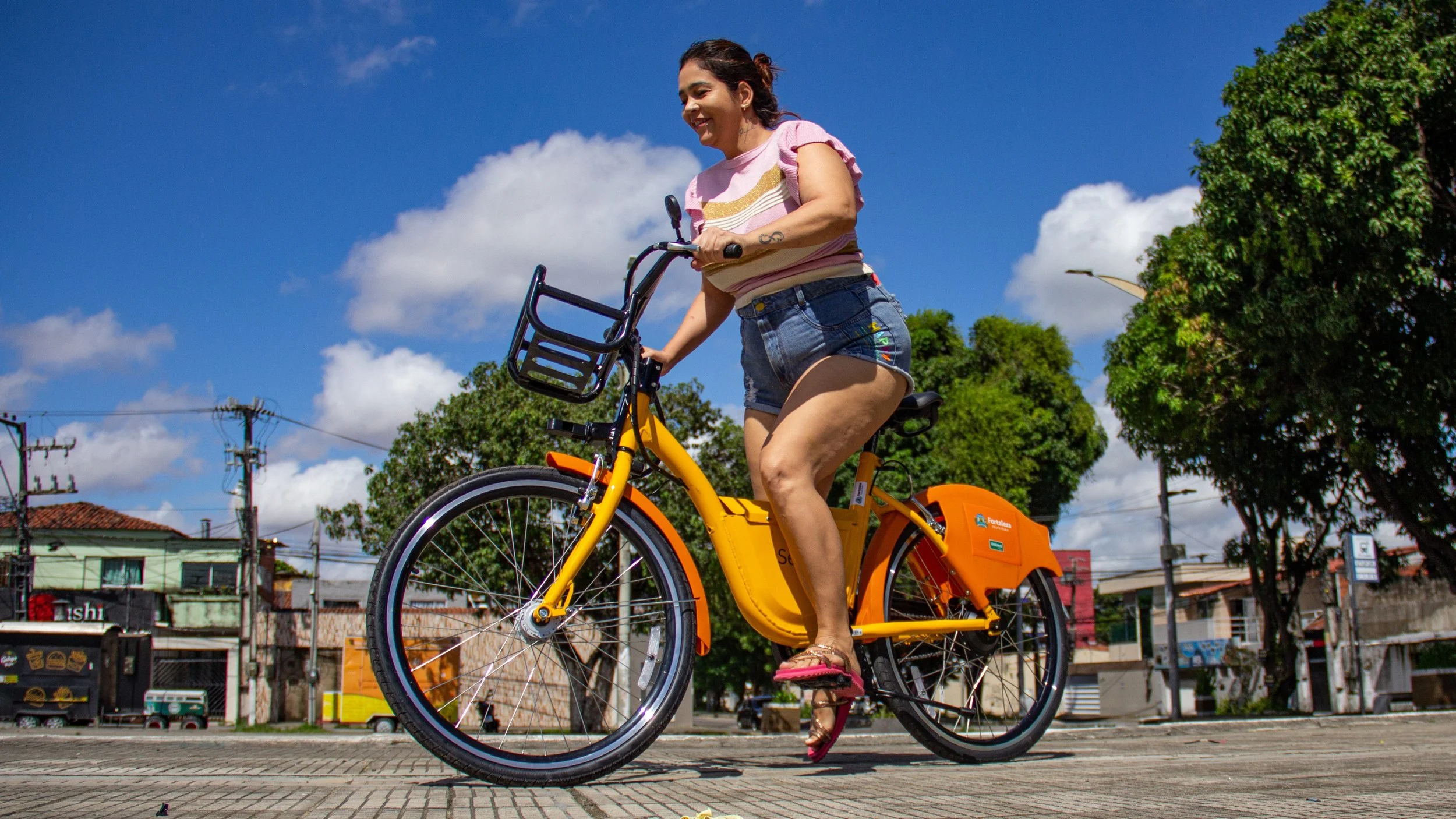Having grown steadily since the launch of YouBike in Taipei in 2009, Taiwan has built one of the most comprehensive bike-sharing ecosystems in Asia. This system is now present in most major cities and many rural counties (such as Taipei, New Taipei, Taoyuan, Hsinchu, Taichung, Chiayi, Tainan, Kaohsiung, etc.).
Lire la suiteAfter Italy, the UK and Poland, Qucit has set down in Brazil to find out how micromobility works there. Qucit met several experts in the field of micromobility to give you a complete picture of bike-sharing in this country of immense potential.
Lire la suiteIn recent years, India has seen the emergence of bike-sharing systems in several major cities. Inspired by European and Chinese experiences and supported by national policies promoting sustainable urban mobility, these services offer an affordable, eco-friendly alternative suited for short-distance travel. According to a 2011 census, 25% of Indian workers lived within one kilometer of their workplace, and one-third between two and five kilometers. Faced with increasingly congested and polluted cities, bike-sharing appears to be a concrete response to the challenges of mobility, inclusion, and ecological transition. Between promising trials, structural obstacles, and evolving business models, this form of soft mobility is finding its place in India’s urban landscape.
Lire la suiteAs the Velo-city conference gets underway this week in Gdańsk, Zag Daily examines how the Polish city’s MEVO bike-share uses AI technology and local expertise to keep thousands of e-bikes on the move.
Lire la suitePedal Movement, the operator of Long Beach Bike Share, has been using Qucit’s predictive logistics software since March 2023 to tighten up field operations and improve coordination across its network.
Lire la suiteHow Qucit’s AI is making Barcelona’s bike-sharing smarter: real-time forecasts improve bike availability, reduce operational costs, and support the city’s green mobility goals.
Lire la suitePoland is a very surprising country, steeped in history, but one that has seen a considerable boom in self-service bicycle hire systems in recent years. This is thanks to a remarkably well-developed infrastructure and policies that are increasingly geared towards the ecological transition. That's why Qucit took the microphone to meet the local authorities of Krakow, Warsaw and Bydgoszcz. We invite you to discover their stories in this article: Bike-sharing in Poland.
Lire la suiteIn recent years, Italy has become one of the European countries where bike-sharing systems are flourishing. Indeed, in 2024, Italy saw 3 of its cities enter the top 10 European cities with the most journeys made per day by shared bikes per 1,000 inhabitants. These three cities, located in northern Italy, are Bologna, Florence and Padua. To take just the first example, the city of Bologna, with its system of 3,000 e-bikes and 650 mechanical bikes, had reached 567,356 journeys by the first quarter of 2024.
Lire la suiteIn recent years, UK cities have been faced with major urban mobility challenges: traffic congestion, air pollution and the need to promote more sustainable modes of transport. These issues, exacerbated by ambitious environmental targets such as the commitment to achieve carbon neutrality by 2050, are prompting municipalities and citizens alike to rethink their travel habits. In this context, bike-sharing is emerging as an innovative and accessible solution, capable of meeting growing mobility needs while actively participating in the ecological transition.
Lire la suiteFinland is a fascinating country and a true European model in many respects: educational, financial or climatic. Transportation is no exception. Indeed, Finland stands out for its innovative approach to micromobility. The country is banking on a sustainable multimodal transport system.
Lire la suiteOn February 22, 2023, we wrote our first article on vandalism, tackling a subject that all too often remains taboo among local authorities and their operators.
But just because a problem is invisible doesn't mean it doesn't exist. And it's not an isolated case, but a global problem that we're addressing today. Vandalism is universal, and spares no shared micro-mobility system.
Lire la suiteIn Poland, bike-sharing systems are experiencing unprecedented growth, transforming urban mobility practices. These systems, present in major metropolises such as Warsaw and in inter-municipal areas such as the Silesian Metropolis, are part of a global drive towards sustainable modes of transport. Driven by technological advances and growing ecological awareness, these solutions meet today's challenges of CO₂ emission reduction and urban decongestion.
Lire la suiteIn Spain, the rise of self-service bicycles has established itself as an innovative and environmentally-friendly transport solution, suitable for both large conurbations and small towns. In recent years, these mobility systems have seen remarkable expansion, particularly in cities such as Madrid and Barcelona, but also in municipalities with fewer than 400,000 inhabitants, such as Valladolid, Gijón and Santander. This popularity is based on a combination of ecological motivations, technological advances and institutional support, making it possible to reduce car dependency while improving the quality of urban life.
Lire la suiteBordeaux-based Qucit Bike is a software tool dedicated to maximising the efficiency of shared micromobility operations. Qucit’s software powers micromobility systems of all sizes, covering more than 100,000 bikes in more than 30 cities worldwide. Boasting reputable partners like Smovengo, PBSC Urban Solutions and Bicycle Transit Systems, Qucit’s solution cuts rebalancing hours by 40% on average while increasing ridership for its clients by 20-50%.
Lire la suiteWith increasing urbanization, the challenges of urban mobility and equitable access to essential services such as health, employment and education are becoming crucial. These challenges require solutions to ensure that everyone has easy access to essential services. In the United States, where disparities are significant, micromobility can have a major impact on social inclusion.
Lire la suiteThe United States, the world's 4th largest country in terms of surface area and the world's 1st largest power, is a country with a long history of mobility. There has always been a need to innovate in terms of transport, in order to go further and faster. So, in today's context of urgent climate change and increasing urban density, how can we make the last mile by bike part of American life?
Lire la suiteAt a time when sustainability and the reduction of carbon emissions are at the heart of urban concerns, bike-share in the United States is transforming the transportation landscape. In 2023, more than 157 million bikes were used, demonstrating their growing integration into communities' sustainable mobility strategies. But what are the realities behind these promising figures? This article explores the current state, challenges and future of bike sharing in North America, offering a comparative analysis with Europe to outline the prospects for this rapidly expanding mode of transport.
Lire la suiteIn the dynamic sector of micromobility in cycling, increasing female representation is crucial to overcoming systemic barriers and encouraging equity. It is vital to promote the integration and enhancement of women in leadership and development positions. Recent debates at the Velo City 2024 show, in particular the "Women in Cycling: Bring diversity to the bike sector" conference, have highlighted this issue, underlining the importance of diversifying viewpoints in the industry.
Lire la suiteE-bikes are growing in popularity and use in major cities such as New York and Vancouver, and in smaller towns such as Omaha and Lincoln. In Vancouver, the introduction of e-bikes has helped to push the number of annual trips past the one million mark for the first time in 2023. In New York, almost half of the trips made with the Citi Bike system are made on e-bikes, which make up only 20% of the total fleet.
Lire la suiteOn 21 and 22 June, the Qucit team travelled to the UK to attend Move 2023!
Lire la suite




















